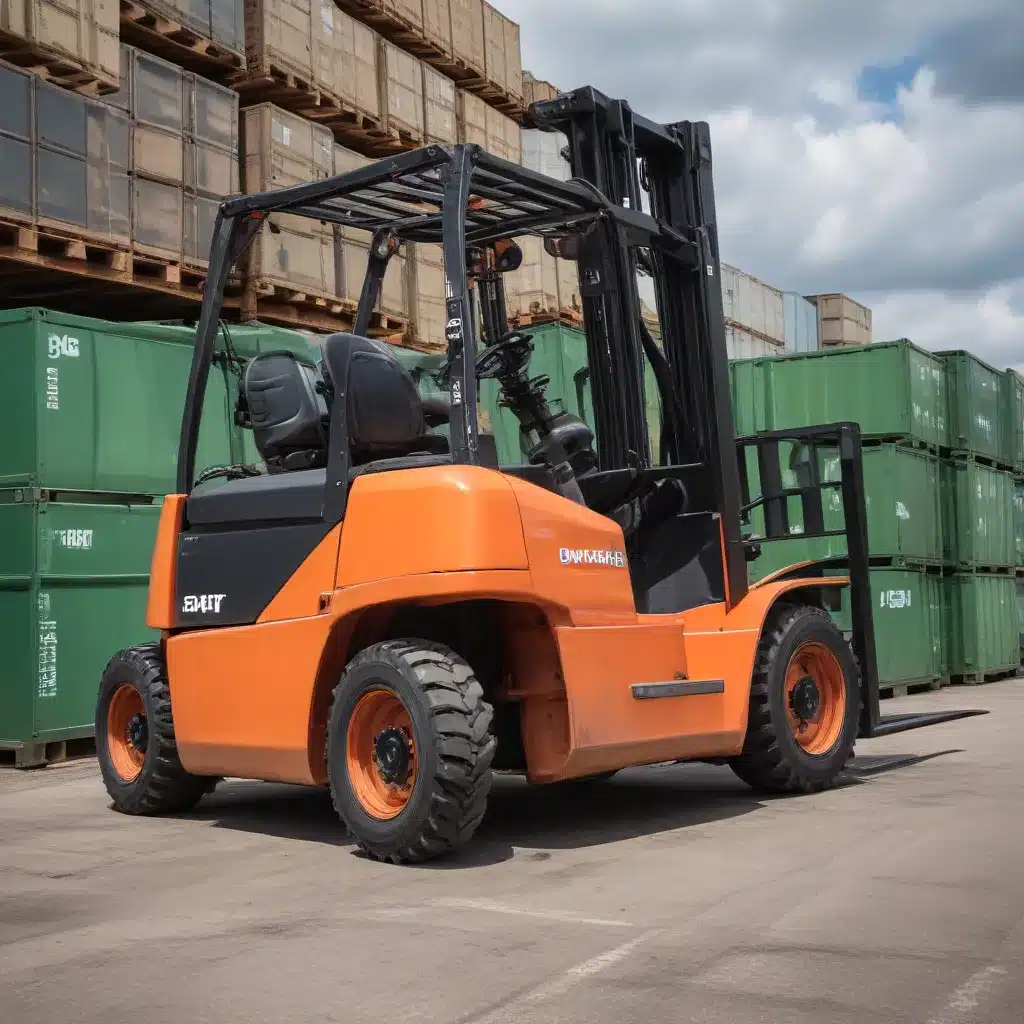
The Rise of Electric Forklifts: Powering a Greener Future
As sustainability becomes a critical priority for businesses across industries, the forklift industry is witnessing a significant shift towards eco-friendly solutions. At the forefront of this transformation is the increasing adoption of electric forklifts, which offer a clean and efficient alternative to traditional diesel-powered models.
Electric forklifts have gained prominence due to their ability to significantly reduce carbon emissions and environmental impact. By eliminating the need for fossil fuels, these zero-emission vehicles contribute to cleaner air and a healthier workplace. The advancements in battery technology have also provided extended runtimes and quicker charging capabilities, making electric forklifts a viable option for a wide range of applications.
Beyond the environmental benefits, electric forklifts offer several economic advantages. With lower operating and maintenance costs compared to their internal combustion counterparts, companies can enjoy long-term cost savings. Additionally, the quieter operation of electric forklifts creates a more pleasant and productive work environment for employees, further enhancing operational efficiency.
Leveraging Telematics and IoT for Sustainable Fleet Management
Forklift fleet management has evolved significantly with the integration of telematics and the Internet of Things (IoT). These technologies enable businesses to collect and analyze real-time data on forklift performance, utilization, and maintenance needs, empowering them to make informed decisions that drive sustainability.
Telematics systems, equipped with sensors and data trackers, provide valuable insights into factors such as fuel consumption, idle time, and operator behavior. By monitoring these metrics, fleet managers can identify areas for optimization, implement eco-driving practices, and optimize forklift usage to minimize energy waste.
The connectivity provided by IoT further enhances sustainable fleet management. Forklifts can communicate with other warehouse equipment, enabling seamless coordination and efficient material handling. This integration can help reduce unnecessary movements, optimize workflows, and improve overall energy efficiency within the facility.
Predictive Maintenance: Extending Forklift Lifespan
Embracing sustainable forklift fleet management extends beyond the selection of eco-friendly equipment. Implementing predictive maintenance strategies is crucial for maximizing the lifespan of forklifts and reducing their environmental impact.
By analyzing historical data and using advanced analytics, predictive maintenance algorithms can forecast potential issues and recommend proactive maintenance actions. This approach helps avoid unplanned downtime, minimize the need for premature replacements, and ensure the optimal performance of forklifts throughout their lifecycle.
Predictive maintenance not only enhances sustainability but also delivers financial benefits. By minimizing repair costs and extending the useful life of forklifts, businesses can achieve significant cost savings and improved return on investment.
Fostering a Culture of Sustainability: Empowering Forklift Operators
Sustainable forklift fleet management extends beyond the technological aspects; it also requires a cultural shift within the organization. Empowering forklift operators to adopt eco-friendly driving habits and maintenance practices is crucial for maximizing the environmental benefits of the fleet.
Comprehensive training programs should educate operators on the importance of sustainable practices, such as avoiding excessive idling, smooth acceleration and deceleration, and proper battery charging protocols. By instilling a sense of environmental responsibility, businesses can encourage operators to become active participants in the sustainability journey.
Additionally, fostering a culture of continuous improvement and employee engagement can lead to innovative ideas and suggestions for further enhancing the sustainability of the forklift fleet. This collaborative approach empowers the entire workforce to contribute to the organization’s environmental goals.
Embracing Innovative Solutions: Hydrogen Fuel Cells and Autonomous Forklifts
As the forklift industry continues to evolve, businesses are exploring even more innovative solutions to improve sustainability. One such technology on the horizon is hydrogen fuel cell-powered forklifts, which offer extended runtimes and faster refueling times compared to traditional battery-powered models.
Hydrogen fuel cells produce electricity through a chemical reaction, with water vapor as the only byproduct. This clean energy source aligns seamlessly with the sustainability objectives of forward-thinking organizations, paving the way for a greener future in material handling.
Furthermore, the introduction of autonomous forklifts has the potential to revolutionize warehouse operations. These self-driving vehicles, equipped with advanced sensors and AI algorithms, can navigate the facility efficiently, optimize routes, and minimize idle time. By eliminating the need for human operators, autonomous forklifts can significantly reduce energy consumption and emissions, while enhancing overall productivity and safety.
Partnering for Success: The Role of Forklift Suppliers and Consultants
Achieving sustainable forklift fleet management is not a solo endeavor. Businesses can benefit greatly from partnering with experienced forklift suppliers and consulting firms that specialize in warehouse optimization and fleet management.
Forklift suppliers, such as Forklift Reviews, can provide valuable insights into the latest eco-friendly models, helping organizations make informed purchasing decisions. These suppliers often have the expertise to guide clients through the transition to electric or alternative fuel forklifts, ensuring a seamless integration into existing operations.
Consulting firms, like HCO Innovations, offer comprehensive solutions to help businesses optimize their forklift fleets and enhance sustainability. These experts can conduct in-depth assessments, develop strategic plans, and implement cutting-edge technologies to drive efficiency, reduce costs, and minimize the environmental impact of the fleet.
By collaborating with industry partners, businesses can leverage their expertise, access the latest sustainable innovations, and develop a holistic approach to forklift fleet management that aligns with their environmental objectives.
Conclusion: The Future of Forklift Sustainability
As the world becomes increasingly conscious of the need for sustainable practices, the forklift industry is at the forefront of this transformation. The rise of electric forklifts, the integration of smart technologies, and the focus on predictive maintenance are all paving the way for a greener and more efficient future in material handling.
By embracing these eco-friendly solutions and fostering a culture of sustainability, businesses can not only reduce their carbon footprint but also reap the economic benefits of optimized operations and increased competitiveness. As the industry continues to evolve, the opportunities for innovation and environmental stewardship are vast, and those who lead the charge will undoubtedly be the ones to shape the future of forklift fleet management.

